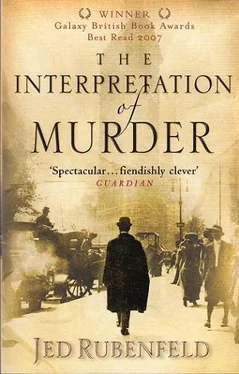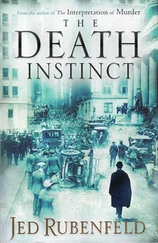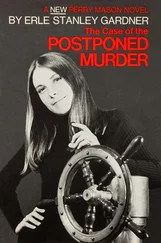Jed Rubenfeld - The Interpretation of Murder
Здесь есть возможность читать онлайн «Jed Rubenfeld - The Interpretation of Murder» весь текст электронной книги совершенно бесплатно (целиком полную версию без сокращений). В некоторых случаях можно слушать аудио, скачать через торрент в формате fb2 и присутствует краткое содержание. Жанр: Исторические приключения, на английском языке. Описание произведения, (предисловие) а так же отзывы посетителей доступны на портале библиотеки ЛибКат.
- Название:The Interpretation of Murder
- Автор:
- Жанр:
- Год:неизвестен
- ISBN:нет данных
- Рейтинг книги:5 / 5. Голосов: 1
-
Избранное:Добавить в избранное
- Отзывы:
-
Ваша оценка:
- 100
- 1
- 2
- 3
- 4
- 5
The Interpretation of Murder: краткое содержание, описание и аннотация
Предлагаем к чтению аннотацию, описание, краткое содержание или предисловие (зависит от того, что написал сам автор книги «The Interpretation of Murder»). Если вы не нашли необходимую информацию о книге — напишите в комментариях, мы постараемся отыскать её.
The Interpretation of Murder — читать онлайн бесплатно полную книгу (весь текст) целиком
Ниже представлен текст книги, разбитый по страницам. Система сохранения места последней прочитанной страницы, позволяет с удобством читать онлайн бесплатно книгу «The Interpretation of Murder», без необходимости каждый раз заново искать на чём Вы остановились. Поставьте закладку, и сможете в любой момент перейти на страницу, на которой закончили чтение.
Интервал:
Закладка:
'What evidence?'
I told her of our trip to the caisson. Even now, I explained, Detective Littlemore might have confirmed that the contents of the trunk belonged to Miss Riverford, which would be all he needed to put Mr Banwell under arrest. Perhaps Banwell was under arrest already.
'I doubt it very much,' said Nora, shutting her eyes. 'Tell me something else.'
'What?'
'Tell me anything so long as it does not concern George Banwell.'
In the Acton residence on Gramercy Park, Nora's mother was ransacking her daughter's bedroom. Nora had disappeared. Mildred Acton sent Mrs Biggs to see if Nora was in the park, but the girl was not there. The thought of being deceived by her daughter filled Mrs Acton with indignation. Apparently her daughter was deranged, wicked and deranged. Nothing she said could be trusted. Mrs Acton had seen the discovery of cigarettes and cosmetics in her daughter's bedroom; what else might she be concealing there?
Mrs Acton found nothing worth confiscating until she poked a hand beneath her daughter's pillow. She was astonished to discover a kitchen knife.
The discovery had an odd effect on Mildred Acton. For a split second, a series of bloody images flashed through her mind. Among these were memories of the birth of her only child, which in turn reminded Mrs Acton, as it always did, that she and her husband had slept in different beds since that day. A moment later, these sanguinary images and associations were gone. Mrs Acton had quite forgotten them, but they left her in a state. Feeling a great sense of her own propriety in protecting her daughter from herself, she returned the knife to its place in the kitchen.
Mrs Acton wished her husband would do something. She wished he were not so hopeless, always holed up in his study in town or playing polo in the country. Harcourt spoiled Nora dreadfully. But then Harcourt was a failure at everything. If he had not inherited a small fortune from his father, the man would have ended in the poorhouse. Mildred had told him so many times.
Mrs Acton decided she must call at once on Dr Sachs for another electromassage treatment. True, she had just had one yesterday and the cost was outrageous, but she felt she couldn't live without another. Dr Sachs was so good at it. It would have been nicer, she reflected, if she had found, a Christian physician who was equally expert. But didn't everyone say the best doctors were Jewish?
Naturally my mind went blank the moment Nora asked me to say something to distract her. Then it came to me. 'Last night,' I said, 'I solved "To be, or not to be.'"
'I didn't know a solution was required,' she answered.
'Oh, people have been trying to solve it for centuries. But no one has, because everyone has always thought that not to be means to die.'
'Doesn't it?'
'Well, there's a problem if you read it that way. The whole speech equates "not to be" with action: taking up arms, taking vengeance, and so on. So if not to be meant to die, then death would have the name of action on its side, when surely that title belongs to life. How did acting get on the side of not being? If we could answer that question, we would know why, for Hamlet, "to be" means not to act, and then we would have solved the real riddle: why he doesn't act, why he is paralyzed for so very long. I'm boring you, I'm sorry.'
'You aren't in the least. But "not to be" can only mean death,' said Nora. 'Not to be means' — she shrugged — 'not to be.'
I had been reclining on my side. Now I sat up. 'No: I mean yes. I mean, "not to be" has a second meaning. The opposite of being is not only death. Not for Hamlet. To not be is also to seem '
'To seem what?'
'Just to seem ' I stood, pacing and, I'm ashamed to say, cracking my knuckles savagely. 'The clue has been there all along, at the very beginning of the play, where Hamlet says, "Seems, madam? Nay it is. I know not 'seems.'" Think of it. Denmark is rotten. Everyone ought to be in mourning for Hamlet's father. His mother especially ought to be in mourning. He, Hamlet, ought to be king. Instead, Denmark is celebrating his mother's marriage to, of all people, his loathsome uncle, who has assumed the throne.
'And what most galls him is the feigning of grief, the seeming, the wearing of black by people who can't wait to feast at the marriage tables and disport themselves like animals in their beds. Hamlet wants no part of such a world. He won't pretend. He refuses to seem. He is.
'Then he learns of his father's murder. He swears revenge. But from that point on, he enters the world of seeming. His first step is to "put on an antic disposition" — to pretend to be mad. Next he listens in awe as an actor weeps for Hecuba. Then he actually instructs the players on how to pretend convincingly. He even writes a script for them himself, to be played that night, a scene he must pretend is anodyne, but that will actually reenact his father's murder, in order to surprise his uncle into an admission of guilt.
'He is falling into the domain of playing, of seeming.
For Hamlet, "To be, or not to be" isn't "to be, or not to exist." It's "to be, or to seem"; that's the decision he has to make. To seem is to act — to feign, to play a part. There's the solution to all of Hamlet, right there, in front of everyone's nose. Not to be is to seem, and to seem is to act. To be, therefore, is not to act. Hence his paralysis! Hamlet was determined not to seem, and that meant never acting. If he holds to that determination, if he would be, he cannot act. But if he would take arms and avenge his father, he must act — he must choose to seem, rather than to be.'
I looked to my audience of one. 'I see,' she said. 'Because he must deceive to get at his uncle.'
'Yes, yes, but it's also universal. All action is acting. All performing is performance. There's a reason these words have double meanings. To design means to plan, but also to deceive. To fabricate is to make with skill, but also to deceive. Art means deception. Craft — deception. There is no escaping it. If we would play a part in the world, we must act. Say a man psychoanalyzes a woman. He becomes her doctor; he assumes a role. It isn't lying, but it is acting. If he drops that role with her, he assumes another — friend, lover, husband, whatever it is. We can choose what part we play, but that's all.'
Nora's brows were knit. 'I've acted,' she said. 'With you.'
It happens that way sometimes: the moment of truth erupts right in the middle of some other scene, when the action is elsewhere and the attention diverted. I knew what she must be talking about: her secret fantasy about her father, which she had confessed yesterday, but which she had naturally tried to keep secret. 'It's my fault,' I replied. 'I didn't want to hear the truth. I felt the same way about Hamlet for the longest time. I didn't want to believe that Freud's view of the play could be right.'
'Dr Freud has a view about Hamlet?' she inquired.
'Yes, it's — it's what I told you. That Hamlet has a secret wish to — to have sex with his mother.'
'Dr Freud says that?' she exclaimed. 'And you believe it? How repulsive.'
'Well, yes, but I'm a little surprised to hear you say so.'
'Why?' she asked.
'Because of what you said yesterday.'
'What did I say?'
'You confessed,' I said, 'to the same kind of incestuous wish.'
'You are insane.'
I lowered my voice but spoke severely. 'Miss Acton, you admitted to me in the park yesterday, very plainly, that you were jealous when you saw Clara Banwell with your father. You said you wished you were the one who — '
She flushed scarlet. 'Stop it! Yes, I said I was jealous, but not of Clara! How disgusting! I was jealous of my father!'
We faced each other, both standing now, across the little woolen blanket. A pair of squirrels, which had been frolicking about a nearby tree trunk, froze in their tracks and eyed us suspiciously. 'That's why you thought you were vile?' I asked.
Читать дальшеИнтервал:
Закладка:
Похожие книги на «The Interpretation of Murder»
Представляем Вашему вниманию похожие книги на «The Interpretation of Murder» списком для выбора. Мы отобрали схожую по названию и смыслу литературу в надежде предоставить читателям больше вариантов отыскать новые, интересные, ещё непрочитанные произведения.
Обсуждение, отзывы о книге «The Interpretation of Murder» и просто собственные мнения читателей. Оставьте ваши комментарии, напишите, что Вы думаете о произведении, его смысле или главных героях. Укажите что конкретно понравилось, а что нет, и почему Вы так считаете.












